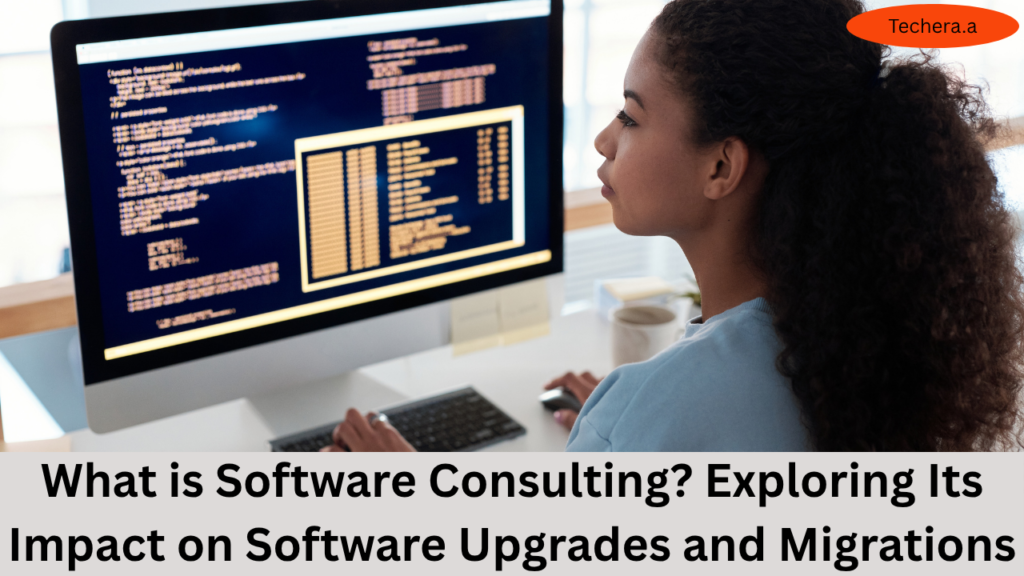
What is Software Consulting? It’s the expert guidance that helps businesses navigate complex software upgrades and migrations smoothly. In this post, we explore what software consulting entails and how it minimizes risks, reduces downtime, and ensures successful transitions. Understanding what software consulting is can be the key to modernizing your systems with confidence.
Introduction
If you’ve ever groaned at a software update or broken a sweat thinking about moving to a new system, you’re not alone. Upgrades and migrations are big deals — they can either level up your business or leave you stuck in IT limbo. That’s What is software consulting comes in.
In this article, we’ll unpack what software consulting really means, especially when it comes to software upgrades and migrations. Whether you’re a tech-savvy startup or a growing enterprise, this guide is here to help you navigate the complexities with clarity.
Defining Software Consulting
The Core Purpose
Software consulting is about more than just advice — it’s a partnership that guides businesses through tech decisions, from planning to execution. Think of consultants as your digital transformation co-pilots.
Who Are Software Consultants?
They are seasoned experts that blend business savvy with in-depth technical expertise. They help you decide what to upgrade, how to migrate, and when to do it — all while keeping your business goals in focus.
Common Types of Software Consulting Services
- Strategic IT consulting
- Migration planning and support
- System audits and performance optimization
- Cloud consulting and DevOps integration
The Role of Software Consultants in Modern Businesses

Strategic Planning & Roadmapping
Consultants help map out the upgrade or migration journey so that you’re not flying blind.
Technology Assessment
Are your current tools outdated or underperforming? Consultants audit and assess your tech stack to figure out what needs an upgrade or migration.
Risk Management & Mitigation
No one likes downtime. They align technology innovations with your business plan.
Understanding Software Upgrades
What Are Software Upgrades?
Software upgrades involve replacing old versions with newer, more efficient versions. It could be as easy as applying a patch or as difficult as doing a complete version change.
Why Businesses Upgrade Software
- Improved performance
- Enhanced security
- New features
- Better user experience
Challenges During Upgrades
- Compatibility issues
- Data loss risk
- Downtime during updates
- User training needs
How Software Consulting Facilitates Upgrades
Pre-upgrade Analysis & Audit
Consultants start by understanding the current setup. They identify bottlenecks and areas needing improvement.
Upgrade Strategy and Planning
They lay out timelines, backup plans, rollback options, and required tools — leaving nothing to chance.
Execution and Monitoring
Consultants often oversee the upgrade, ensuring tasks are executed correctly and testing is thorough.
Post-upgrade Support
After implementation, they ensure everything’s running smoothly, offering training and troubleshooting as needed.
Exploring Software Migrations
What Is Software Migration?
Migration is the process of moving from one platform, system, or environment to another. This could involve switching from one CRM to another or from on-premise to cloud.
When and Why to Migrate?
- End-of-life software
- Scalability issues
- Cost inefficiency
- Security vulnerabilities
Migration Types – Data, Platform, and Application
- Data Migration: Moving databases or datasets.
- Platform Migration: Moving from one OS or cloud provider to another.
- Application Migration: Shifting software apps to different frameworks or systems.
The Role of Software Consulting in Migration Projects
Assessing Migration Readiness
Consultants evaluate your infrastructure and readiness to oversee a migration process in order to reduce surprises.
Also Read : What is Software Consulting? How It Helps Businesses With Custom Software Development
Selecting the Right Tools and Methods
They pick the right migration tools, whether it’s AWS Migration Hub, Azure Migrate, or something custom.
Ensuring Data Integrity and Security
The most valuable asset is data, which specialists make sure is safe and undamaged while in transit.
Minimizing Downtime and Business Disruption
Smart scheduling and staged rollouts ensure your business keeps running during the transition.
Real-World Use Cases
Legacy System Modernization
usinesses that are trapped with antiquated legacy systems seek assistance from consultants to modernize their operations.
Cloud Migration Projects
Many organizations are moving to cloud platforms like AWS, Azure, or Google Cloud with consultant support.
ERP & CRM Upgrades
Upgrading systems like SAP, Oracle, or Salesforce without breaking existing workflows is a job perfectly suited for experienced consultants.
Tools and Technologies Used in Upgrades and Migrations
DevOps and Automation
CI/CD pipelines, containers (like Docker), and orchestration tools (like Kubernetes) help streamline upgrades.
Backup and Recovery Tools
Tools like Veeam, Acronis, and native cloud backup solutions prevent data loss disasters.
Cloud Platforms and Integration Tools
AWS, Azure, GCP, Zapier, and MuleSoft help make migrations seamless and connected.
Benefits of Hiring a Software Consultant
Saves Time and Money
Avoid trial-and-error. Consultants fast-track your upgrade/migration with less wasted effort.
Enhances Software Performance
You get expert-backed upgrades that actually improve efficiency, not slow things down.
Avoids Common Pitfalls
Skipping steps or misconfiguring systems can be costly — consultants help dodge those bullets.
Choosing the Right Consultant for Upgrade/Migration

What to Look For
- Proven experience
- Industry expertise
- Strong portfolio
- Transparent communication
Questions to Ask Before Hiring
- Have you worked on similar projects?
- What’s your upgrade/migration strategy?
- How do you handle data protection?
Future Trends in Software Consulting
AI and Machine Learning in Consulting
Expect smarter tools that can predict upgrade/migration challenges before they occur.
Continuous Migration Models
Some companies are moving toward ongoing migration models instead of one-time projects.
Enhanced Cybersecurity Integration
Security-first consulting is becoming the standard, not an option.
Conclusion
Software upgrades and migrations are no longer optional — they’re essential. But they’re also complex, time-sensitive, and risky without the right help. That’s why software consulting isn’t just valuable — it’s vital.
Whether you’re updating old systems, moving to the cloud, or optimizing what you already have, a skilled consultant can mean the difference between success and struggle.
Frequently Asked Question
Q. What distinguishes software migration from software upgrade?
A. Upgrades improve an existing system; migrations move data/systems to a new environment.
Q. What is the typical duration of a software migration?
A. It depends on the size and complexity, but it can range from a few weeks to several months.
Q. Can software consulting help during a cloud migration?
A. Absolutely. Consultants help plan, execute, and support cloud moves, reducing risk and ensuring continuity.
Q. Is hiring a consultant worth it for small businesses?
A. Yes, especially if you lack in-house expertise. The time and money saved can result in a significant return on investment.
Q. What risks can consultants help avoid during upgrades?
A. They prevent data loss, downtime, compatibility issues, and performance slowdowns by planning properly.

